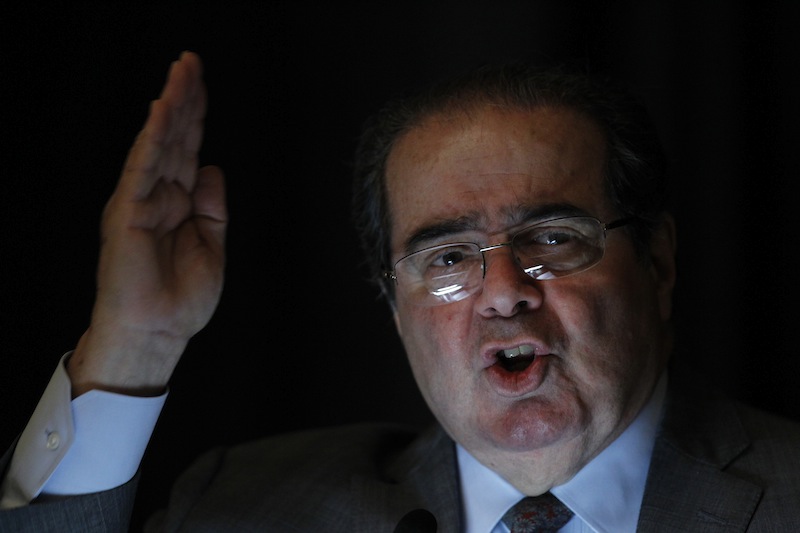Against the protests of liberals on the bench, conservative justices signaled Tuesday during oral arguments for McCutcheon v. FEC that the Supreme Court may further unwind campaign finance restrictions by eliminating federal limits on how much individuals may donate to political candidates and committees.
Justice Antonin Scalia, who led the charge for conservatives, disputed the idea that giving large amounts to candidates or parties reflects “corruption,” instead likening it to “gratitude.”
“I mean, if gratitude is corruption, don’t those independent expenditures [by PACs] evoke gratitude?” he said. “It’s not as if we’re prohibiting big money from being in politics. Big money can be in political — you just can’t give to political parties.”
Scalia was referring to the 2010 case, Citizens United v. FEC, which gave rise to super PACs by invalidating limits on independent campaign expenditures by corporations, labor unions and associations.
The case justices heard oral arguments on Tuesday was brought in 2012 by Shaun McCutcheon and the Republican National Committee, who argued that the Federal Election Campaign Act’s biennial limit on individual contributions violated their First Amendment rights. It has the potential to further dismantle the campaign spending limits the justices scaled back with the Citizens United decision.
The irony of conservatives referring to Citizens United wasn’t lost on Kagan. “If this court is having second thoughts,” she said, “we could change that part of the law!” Laughs ensued in the courtroom.
Based on the justices’ questioning during the hour-long oral arguments, it’s plausible that conservatives could muster five votes to unwind some of the restrictions at stake.
“What troubles me about your argument,” Justice Samuel Alito told U.S. Solicitor General Donald Verrilli, who defended the campaign finance restrictions, “is what I see are wild hypotheticals that … lack any empirical support.”
Chief Justice John Roberts wondered why an individual who cared about gun control and environmental regulations shouldn’t be allowed to give to candidates and parties in favor of both those issues during a given year, instead of having to choose between them.
Roberts did sympathize with one part of Verrilli’s argument — that transfers from political committees could lead to large concentrations of money for one or a handful of candidates. “I take your point there,” he said, asking if there’s a “possibility of prohibiting those transfers.”
The four liberal-leaning justices appeared to favor the restrictions out of concern that lifting them would encourage corruption.
Justice Elena Kagan asked the plaintiffs’ lawyer, Erin Murphy, that if she were to give millions to multiple parties, “are you suggesting that party, or those parties, won’t owe me anything — that I won’t get special treatment? … That I won’t have a very, very special seat at the table?”
Verrilli, who was widely panned for his halting performance during the Obamacare arguments last year, was in top form Tuesday. “Aggregate limits combat corruption,” he opened, arguing that if the existing limits were struck, “the dangers of quid pro quo corruption would be obvious and apparent.”
Justice Anthony Kennedy rarely spoke and didn’t reveal much. As is often the case, his vote may determine the outcome out of the case. He’s believed to be sympathetic to the plaintiffs after authoring the extremely controversial 5-4 decision in Citizens United.
Justice Clarence Thomas didn’t speak, as is customary for him, but his prior jurisprudence makes him widely expected to rule against the law.
Senate Minority Leader Mitch McConnell (R-KY), an ardent opponent of campaign finance regulations, was a party to the case. The court granted his advocate, Bobby Burchfield, 10 minutes to make his argument against the campaign limit in question.
The questioning of attorneys gave way to a moment of sparring between justices Ruth Bader Ginsburg and Scalia, who are good friends despite their profound ideological differences.
“Whose expression is at stake when most people couldn’t even come near the limit?” asked Ginsburg. Scalia retorted, with his famous jolt of sarcasm, “I assume a law that only prohibits the speech of two percent of the country is okay.”






